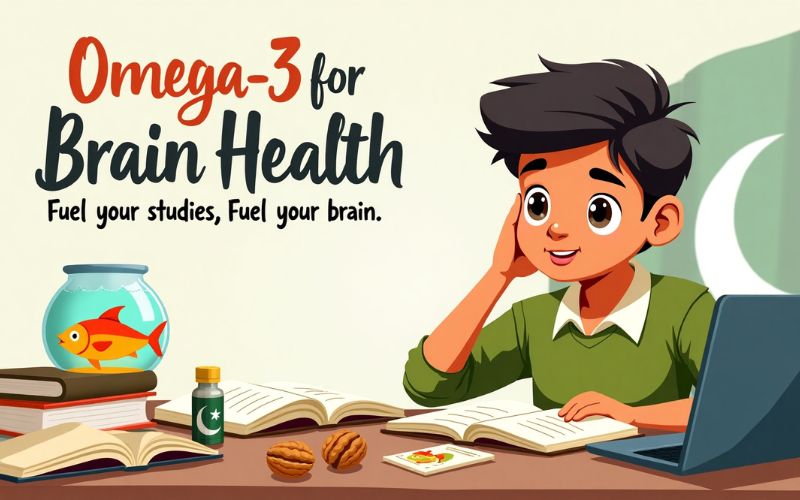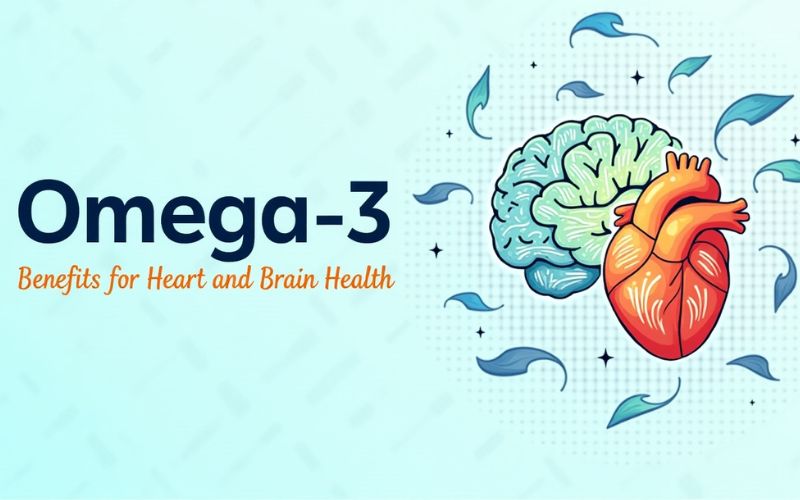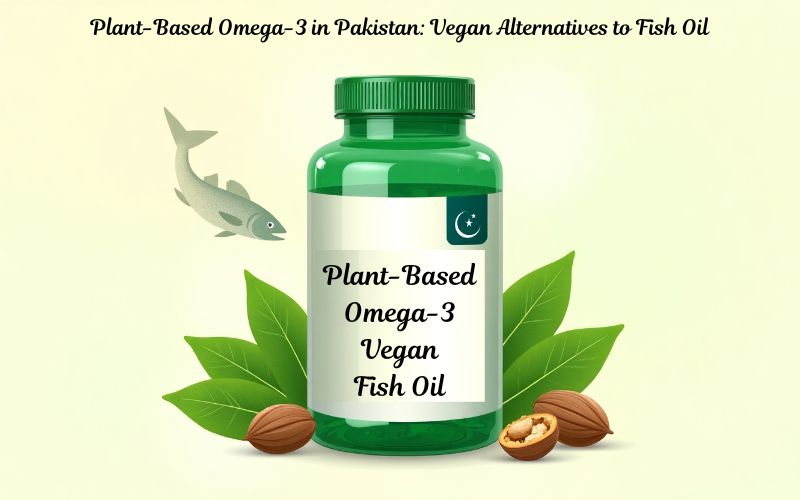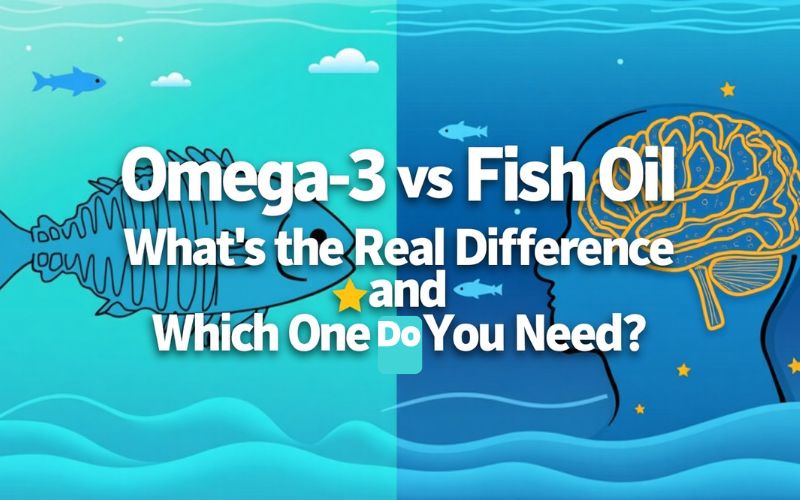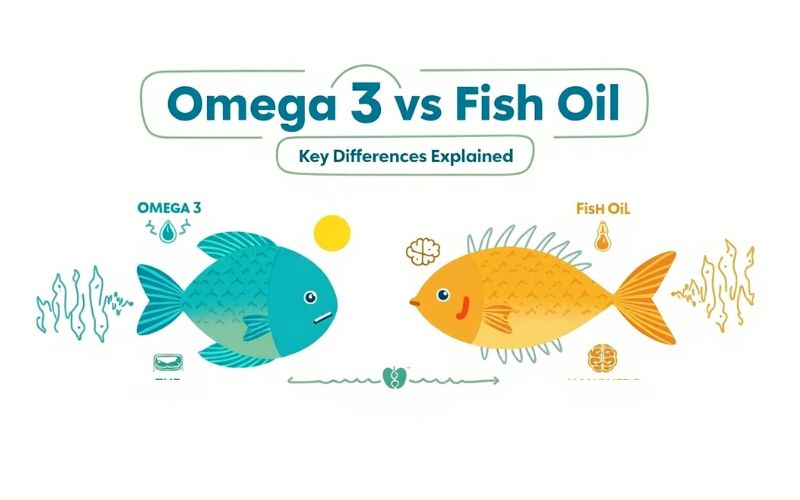In today’s fast-paced academic environment, students in Pakistan face intense mental challenges be it from exam pressure, online classes, or maintaining consistent focus. One natural solution gaining popularity is omega 3 for students in Pakistan for brain health. These essential fatty acids are not just buzzwords—they play a critical role in improving memory, concentration, and overall brain function.
Table of Contents
What Is Omega-3 and Why Is It Important?
Omega-3 fatty acids are a group of polyunsaturated fats crucial for the brain, heart, and overall body function. The three main types are:
- ALA (Alpha-linolenic acid) – Found in flaxseeds, walnuts, and chia seeds
- EPA (Eicosapentaenoic acid) – Primarily found in fatty fish
- DHA (Docosahexaenoic acid) – A vital building block of the brain
While the body can convert some ALA into EPA and DHA, the process is inefficient. This is why a diet rich in EPA and DHA is important—especially for growing students.
The Role of Omega-3 in Student Brain Health
Research from global health institutions consistently shows a link between omega-3 intake and cognitive performance. DHA, in particular, is known for supporting neuron development and communication.
Benefits of Omega-3 for Pakistani Students

- Enhanced Memory Retention
Studies suggest that students who regularly consume omega-3 supplements or foods high in DHA experience improved memory—ideal for those preparing for board exams or university entrance tests. - Better Focus and Concentration
Omega-3 is known to reduce mental fatigue and help students stay focused during long study sessions or online classes. - Reduced Anxiety and Stress
Academic life can be mentally taxing. Omega-3, especially EPA, has been shown to reduce symptoms of anxiety, providing students with better emotional resilience. - Improved Sleep Patterns
Healthy omega-3 levels can regulate melatonin production, improving sleep quality—a critical factor for optimal brain function.
Common Sources of Omega-3 in Pakistan
While fish like salmon, mackerel, and sardines are rich in omega-3, they aren’t always accessible or affordable for every student in Pakistan. Fortunately, there are alternatives:
- Fish oil supplements – Widely available and affordable
- Walnuts and flaxseeds – Local, plant-based sources
- Omega-3 fortified eggs – Increasingly available in local markets
- Chia seeds – Gaining popularity in urban centers
Tip: To get maximum benefit, aim for a balanced intake that includes both plant-based and marine sources.
Omega 3 Deficiency in Pakistani Students
Due to dietary habits and limited access to seafood in certain regions, many Pakistani students may unknowingly suffer from omega-3 deficiency. Symptoms include:
- Difficulty concentrating
- Poor memory
- Mood swings
- Sleep disturbances
Regular intake of omega-3 through diet or supplements can help bridge this nutritional gap.
How Much Omega-3 Should Students Take?
The recommended dosage for children and teens varies, but generally:
- Children (5-13 years): 500–1000 mg of DHA+EPA per day
- Teenagers (14–18 years): 1000–1500 mg per day
Consult with a healthcare professional or trusted supplement provider in Pakistan to choose the right dosage.
Choosing the Right Omega-3 Supplement in Pakistan
If you’re considering adding a supplement to your child’s or your own routine, make sure it meets the following criteria:
- High DHA and EPA content
- Third-party tested for purity
- No harmful additives or artificial coloring
- Certified halal (important for Pakistani consumers)
You can find trusted options on Nutritional World Pakistan—a reliable source for high-quality omega-3 supplements tailored for students and families.
FAQs About Omega 3 for Students in Pakistan for Brain Health
Q1: Can Pakistani students get enough omega-3 from their diet alone?
It’s possible, but not always practical. Many students don’t regularly consume oily fish or seeds, making supplementation a smart choice.
Q2: Are there any side effects of omega-3 supplements?
Omega-3 is generally safe, but in high doses, it may cause mild stomach discomfort. Always follow the recommended dosage or consult a doctor.
Q3: Is omega-3 good for school-going children too?
Absolutely! DHA plays a crucial role in brain development in children, helping them perform better academically and emotionally.
Q4: Can vegetarian students in Pakistan benefit from omega-3?
Yes. Plant-based omega-3 sources like flaxseeds and chia seeds contain ALA, but supplements made from algae-based DHA are great for vegetarians.
Q5: How long does it take to see results from omega-3 use?
Improvements in mood, focus, and memory can be seen within 4–12 weeks of consistent use.
Final Thoughts
Omega 3 for students in Pakistan for brain health is more than just a trend—it’s a smart, science-backed choice for families who want to support academic performance and emotional wellbeing. Whether it’s through diet or high-quality supplements, ensuring proper omega-3 intake can help students thrive in school and beyond.
Don’t wait to boost your or your child’s brain power—explore premium omega-3 options at Nutritional World Pakistan today and take the first step toward smarter, healthier learning.














